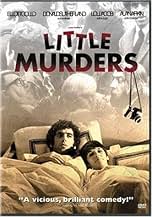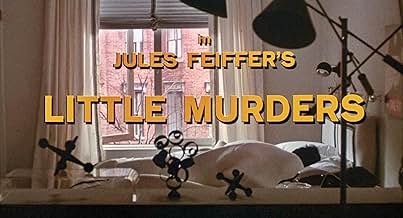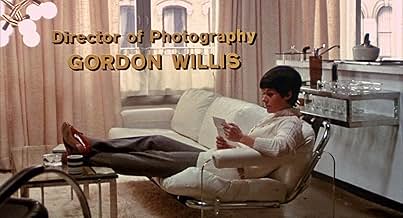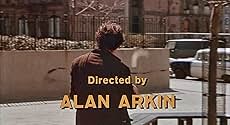Dark comedy where Alfred Chamberlain copes with urban violence, obscene phone calls, rusty water pipes, electrical blackouts, paranoia, and racial conflict during a 1970's summer as he gets ... Read allDark comedy where Alfred Chamberlain copes with urban violence, obscene phone calls, rusty water pipes, electrical blackouts, paranoia, and racial conflict during a 1970's summer as he gets to know his girlfriend Patsy Newquist's family.Dark comedy where Alfred Chamberlain copes with urban violence, obscene phone calls, rusty water pipes, electrical blackouts, paranoia, and racial conflict during a 1970's summer as he gets to know his girlfriend Patsy Newquist's family.
- Awards
- 1 nomination total
- Checkpoint Police Officer
- (uncredited)
Featured reviews
I think that my two favorite scenes are the appearances of Sutherland and Arkin. Sutherland plays a priest who seems to be a cross between Sutherland's characters from "MASH" and "Kelly's Heroes"; Arkin plays a detective who spouts out the craziest monologue explaining why there's a conspiracy behind the murders. Overall, this is very much a New York kind of movie. I should identify that there are several very long scenes during the movie, but it's certainly not a flick that you'll forget anytime soon. Impressive.
The pulse of this movie is subversive and menacing, and even though there are many, many great laughs, I think the classification of it as a comedy is wrong. It never feels like a comedy. In terms of tone, it is something like the pilot for Twin Peaks and a Mamet play and an Odets play, but with some strange off off off off Broadway claustrophobia and seventies nihilistic horror. It displays a collapsed and paranoid urban environment in which people are combative with words and isolated by them.
I feel it should be essential viewing for any writer, as it contains four of the best-- if not the actual four best-- monologues I've ever heard in a movie. Arkin and Sutherland have amazing monologues that are only marginally upstaged by those given by Gould and Jacobi.
I laughed many, many times (as did many people in the sold out screening I attended), but when it ended, the haunting and thoughtful core of the movie lingered more than did the comedy.
A rich and allegorical piece that deserves serious study and accolades.
(I saw a 35mm print of the movie at Film Forum, N.Y.)
remember as being funny mabey. I was skeptical at the beginning, I thought to myself a dated film with an absurd summery on the back. The only reason I sat and watched it was the list of actors, Sutherland and Gould. I was immediately enthralled. I have been a fan of Terry Gilliam films for a long time and to see a film that can achieve his insanity and social messages with out the elaborate sets and costumes Gilliam uses is astounding. The acting is superb, there is no other word that can encapsulate these performances. Every character is riveting until the end. The monologues given are thought provoking to say the least. My original thought that this film was dated could not be farther from the truth, I was in fact surprised by the connections that can be drawn to our modern times. I am surprised that this film did not receive more praise. It is also disappointing that the other Alan Arkin films were given less than glowing reviews. The only question I have is: is it to late to have a cult following for this movie? Anyone else in?
It's very difficult to describe what the movie's "about" except to say that Alfred (Gould) is a photographer who likes to take pictures of s*** (the word he uses for it isn't bleeped by the way) and doesn't really like to fight people - he says he doesn't feel anything, but seems pleasant enough - until during one of these fights he meets the (Alfred's word) "formidable" Patsy (Newquist), and as they have a kinda-sorta romance over time she brings him to meet her parents. And then they decide to get married. And try to live a life. And will Alfred change? Who knows... maybe, and then...
This is irreverence cinematically personified, even more than something like MASH, which also had Gould and Donald Sutherland, the latter of whom I'll get to in a moment. Because the satire here is at such a fever pitch, even in the down-time moments, Arkin won't let the audience catch a break. I imagine that was also the case in Feiffer's play, and how much that differs from this film I can't say. Having Gordon Willis shoot your film certainly makes things much more ambitious and, of course, DARK. And there's some strange... strange is the word to continue using here, better than quirky, things that the filmmakers do here. The lights, for example, at the Newquist's apartment keep dimming in and out for... reasons. It's explained as much as why their son is such a wild lunatic. Of course for other familial quirks, you just got to, as Alfred sort of does, take things in stride.
What Little Murders ultimately is "about", if anything, is the powder-keg like nature of New York, and how it makes its characters and denizens totally crazy. This is more akin to something like Taxi Driver than what one might expect given these actors and the director (MASH, which was its own sort of irreverence, or Altman or Mel Brooks or take your pick of wild risk-takers, is light as a feather compared to this). A big part of it is that everybody here, I must say again, all of the major characters are varying degrees of nuts: even Alfred, who is supposedly the closest to an audience surrogate, is a case study of a sort of withdrawn, don't-give-a-damn personality that, in the wrong hands, could be a disaster of a performance.
Thankfully, Gould is brilliant here, in both the small moments and when he finally does go "big" at the end, which also feels like a tie-in to Taxi Driver in terms of the dark-violence department (though the very last line has the cutting "HA!" feel of Drangelove, just trying to make things connect a little, folks, it's a real original of a film), and the actors who play the parents - Gardenia and Wilson - give their characters some dimension here and there that probably wasn't there on the page. And even in the small roles people are like whacked-out cartoon characters (no wonder, Feiffer was and still is a cartoonist): Sutherland and Arkin himself as the detective are the best positive and negative examples of this. While Sutherland almost threatens to steal the movie with his show-stopping, gut-bustingly/deadpan funny performance as a minister at the wedding, giving the sort of monologue that is gold for an actor to recite... Arkin, directing himself, goes so far over the top to a point where it doesn't work, even, yes, for Little Murders.
You don't get many movies like this any more. Sure, there are "quirky", "off-beat" New York comedies, and sometimes they can get shocking in their violence. But rarely do you ever get a film that demands the viewer pay attention, even when (or because) it's at its most non-sensible and strange. And characters *do* have to face obstacles here and face change, which is impressive. By the time Gould's Alfred reaches that final 15/20 minutes, it's really more of a tragedy than anything else, and the delivery he has right before this when he comes to a personal realization about himself, and then that is taken from him in a snap, and then his final turn around at the end, it's a roller-coaster of a look at the horror of a mega-violent, nihilistic place like New York could get then.
If only the first half was a little stronger or more consistent - there are points things are SO manic with the family when we first meet them it seems like it could go, and does go, on too long - it would be a masterpiece. As it is, Little Murders reflects a point of view and psychology that is deranged, twisted, and often very funny, a mirror for the time and place not unlike the UK with Clockwork.
Did you know
- TriviaAfter seeing the film, Jean Renoir wrote to Alan Arkin, telling him "this film will never be forgotten".
- Quotes
Rev. Dupas: Why does one decide to marry? Social pressure? Boredom? Loneliness? Sexual appeasement? Love? I won't put any of these reasons down. Each in its own way is adequate, each is all right. Last year, I married a musician who wanted to get married in order to stop masturbating. Please, don't be startled, I'm not putting him down. That marriage did not work. But the man tried. He is now separated, still masturbating, but he is at peace with himself because he tried society's way.
- Alternate versionsOriginally rated 'R' when released in the U.S in 1971. In 1973 the film was cut to be re-rated 'PG' for a re-release.
- ConnectionsFeatured in Alan Arkin: Live from the TCM Classic Film Festival (2015)
- SoundtracksSkating In Central Park
Composed by John Lewis
Performed by The Modern Jazz Quartet
Through the courtesy of United Artists Records, Inc.
- How long is Little Murders?Powered by Alexa
Details
Box office
- Budget
- $1,340,000 (estimated)
- Runtime1 hour 48 minutes
- Color
- Aspect ratio
- 1.85 : 1
Contribute to this page
































